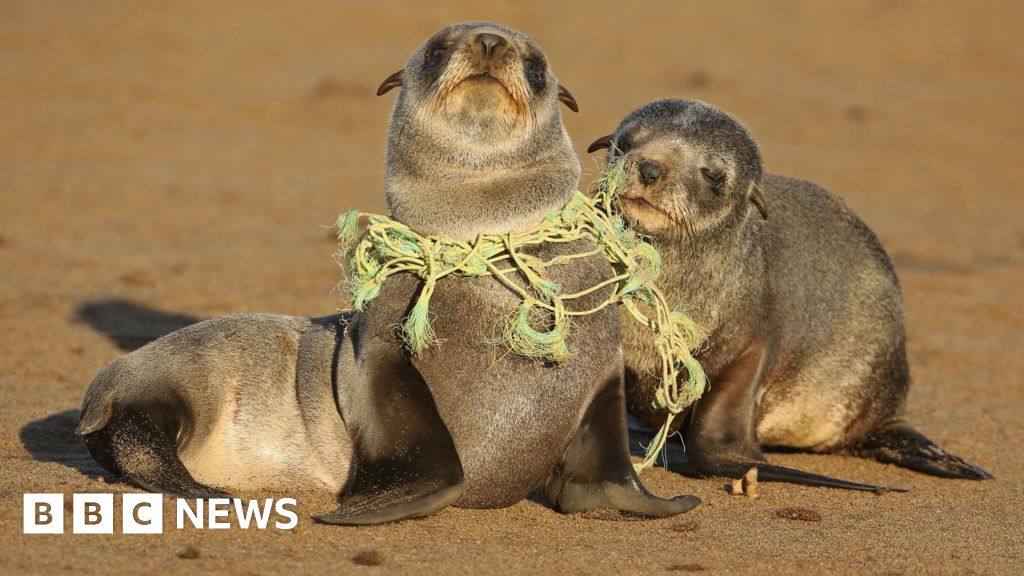Science
Study Reveals Plastic’s Deadly Impact on Marine Wildlife

A recent study has unveiled the alarming effects of plastic ingestion on marine wildlife, based on an extensive analysis of over 10,000 marine animal autopsies. Researchers discovered that seabirds face a significant mortality risk after consuming as few as 23 pieces of plastic, leading to a staggering 90% chance of death. Marine mammals, including seals and dolphins, reach a similar critical threshold after ingesting just 29 pieces, while sea turtles are at risk after consuming around 405 pieces of plastic.
The findings underscore the minimal volume of plastic that can prove fatal. For instance, less than a soccer ball’s worth of soft plastic can be lethal to a dolphin, whereas small fragments of rubber, even those smaller than a pea, can be deadly for seabirds. The study highlights a crucial need for enhanced efforts to protect marine ecosystems from plastic pollution.
Key Insights from the Research
Lead researcher, Dr. Erin Murphy, affiliated with the US-based environmental organization Ocean Conservancy, emphasized the urgent threat posed by plastic pollution. “It’s a really important reminder that plastic pollution does pose an existential threat to ocean wildlife,” she stated. The analysis examined autopsy data from a wide range of marine animals, including seabirds, sea turtles, and marine mammals, collected from various locations worldwide.
The research indicated that nearly half of the sea turtles studied, approximately one-third of the seabirds, and one in ten marine mammals had ingested plastic. The researchers categorized the risks associated with different types of plastic for each animal group. They found that rubber posed the highest risk for seabirds, while soft plastics and fishing debris were particularly hazardous to marine mammals. Both hard and soft plastics were found to threaten sea turtles.
The scope of the analysis focused solely on plastics present in the stomachs of the animals, leaving out other potential dangers such as chemical impacts and entanglement. This limitation suggests that the actual extent of harm caused by plastic pollution could be even greater than the study indicates. Numerous marine species have been identified with plastic in their systems, often due to birds swallowing plastic fragments or sea turtles mistaking plastic bags for jellyfish.
Call to Action for Reducing Plastic Pollution
The study provides critical data that can inform global initiatives aimed at tackling plastic pollution. Dr. Murphy noted, “To effectively address plastic pollution, the science is clear. We need to reduce the amount of plastic we produce, improve collection and recycling, and clean up what’s already out there.”
Published in the Proceedings of the National Academy of Sciences, this research serves as a crucial reminder of the urgent need to protect marine wildlife from the pervasive threat of plastic. As the world grapples with increasing plastic waste, the findings call for immediate action to safeguard ocean ecosystems and the diverse species that inhabit them.
-

 Health3 months ago
Health3 months agoNeurologist Warns Excessive Use of Supplements Can Harm Brain
-

 Health3 months ago
Health3 months agoFiona Phillips’ Husband Shares Heartfelt Update on Her Alzheimer’s Journey
-

 Science2 months ago
Science2 months agoBrian Cox Addresses Claims of Alien Probe in 3I/ATLAS Discovery
-

 Science2 months ago
Science2 months agoNASA Investigates Unusual Comet 3I/ATLAS; New Findings Emerge
-

 Science1 month ago
Science1 month agoScientists Examine 3I/ATLAS: Alien Artifact or Cosmic Oddity?
-

 Entertainment2 months ago
Entertainment2 months agoLewis Cope Addresses Accusations of Dance Training Advantage
-

 Entertainment5 months ago
Entertainment5 months agoKerry Katona Discusses Future Baby Plans and Brian McFadden’s Wedding
-

 Science1 month ago
Science1 month agoNASA Investigates Speedy Object 3I/ATLAS, Sparking Speculation
-

 Entertainment4 months ago
Entertainment4 months agoEmmerdale Faces Tension as Dylan and April’s Lives Hang in the Balance
-

 World3 months ago
World3 months agoCole Palmer’s Cryptic Message to Kobbie Mainoo Following Loan Talks
-

 Science1 month ago
Science1 month agoNASA Scientists Explore Origins of 3I/ATLAS, a Fast-Moving Visitor
-

 Entertainment4 months ago
Entertainment4 months agoMajor Cast Changes at Coronation Street: Exits and Returns in 2025









